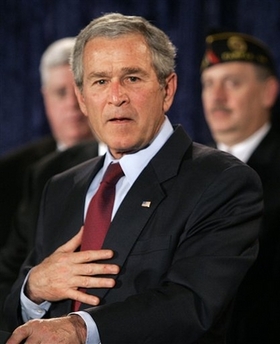Bush invites Dems to meet about Iraq
(AP)Updated: 2007-04-11 08:58
WASHINGTON - US President Bush offered to talk with Democrats about the standoff over war funding, but he made it clear Tuesday he will not embrace any timetable for a US troop withdrawal. Democrats said there was no point in talking if Bush refused to negotiate.
 President Bush delivers remarks on the Iraq war supplemental, Tuesday, April 10,2007, at American Legion Post 177 in Fairfax, Va. [AP]  |
"We can discuss the way forward on a bill that is a clean bill - a bill that funds our troops without artificial timetables for withdrawal, and without handcuffing our generals on the ground," Bush said in a speech to an American Legion audience in nearby Fairfax, Va.
On the one hand, Bush extended an offer to meet with lawmakers Tuesday. On the other, the White House bluntly said it would not be a negotiating session.
The president said if lawmakers don't send him a bill he will sign - one that does not include timetables or money for pet projects in their home districts - it would be Congress, not the White House, that will have to answer to troops.
"The bottom line is this: Congress' failure to fund our troops will mean that some of our military families could wait longer for their loved ones to return from the front lines," Bush said at American Legion Post 177. "Others could see their loved ones headed back to war sooner than anticipated. This is unacceptable."
Senate Majority Leader Harry Reid and House Speaker Nancy Pelosi rejected the terms set by the White House.
"Congressional Democrats are willing to meet with the president at any time, but we believe that any discussion of an issue as critical as Iraq must be accomplished by conducting serious negotiations without any preconditions," they said in a joint statement.
"With his threat to veto such a plan for change in Iraq, President Bush is ignoring the clear message of the American people: We must protect our troops, hold the Iraqi government accountable, rebuild our military, provide for our veterans and bring our troops home. The president is demanding that we renew his blank check for a war without end."
Jim Manley, a spokesman for Reid, said Bush must drop his conditions on the meeting before Reid would attend. Pelosi agreed.
"What the president invited us to do was come to his office so that we could accept without any discussion the bill that he wants," Pelosi said at a news conference in San Francisco. "That's not worthy of the concerns of the American people, and I join with Senator Reid in rejecting an invitation of that kind."
Bush said the Defense Department will soon send Congress a request to transfer $1.6 billion from other military accounts to cover funding for troops - a move needed, he said, because lawmakers have delayed his emergency spending request. He warned that continued delays would undermine troop training, slow the repair of equipment and force soldiers to serve longer tours of duty.
Bush got an assist for his argument on Tuesday from Iraqi Prime Minister Nouri al-Maliki, who said he saw no need to set a timetable for the withdrawal of US troops. His comments in Japan came a day after tens of thousands of Iraqis took to the streets of two Shiite holy cities, demanding that US forces leave the country.
Meanwhile, House Armed Services Committee Chairman Ike Skelton wrote to Defense Secretary Robert Gates questioning whether additional National Guard units named Monday for possible deployment to Iraq will be properly trained and equipped before they leave.
The Missouri Democrat also said he was concerned about another proposal revealed Monday that could keep five active duty brigades in Iraq beyond their planned late-summer homecoming. "I must ask you, Mr. Secretary, where does this end?" Skelton said in his letter Tuesday.
Bush has asked Congress for more than $100 billion to pay for the wars in Iraq and Afghanistan this year. The House and Senate have approved the money, but their bills aim to wind down the war by including timelines for troops to come home - something Bush won't accept.
The Senate bill would require a US troop exit in Iraq to begin within 120 days, with a completion goal of March 31, 2008. The House bill orders all combat troops out by Sept. 1, 2008.
Bush also opposes the bills because of what he calls pork-barrel spending on matters unrelated to the war.
White House deputy press secretary Dana Perino suggested that Bush has the upper hand because Democrats do not have votes to override his veto. And she stressed that the meeting was not a negotiation session.
"The president is not asking to lecture anybody, nor does he want to," Perino said. "We understand that Congress has a role to play. We understand what that role is. I would hope that they understand what the commander in chief's role is. And if a meeting can help alleviate some of the tension, then that's what we're for."
When a reporter said it sounded like an invitation for Democrats to agree with Bush, Perino said, "Well, hopefully so."
Perino said Democrats could benefit by meeting with Bush but said she was not aware of any lawmaker who had accepted his invitation so far. "Maybe they need to hear again from the president about why he thinks it is foolish to set arbitrary timetables for withdrawal," she said.
|
||
|
||
|
|